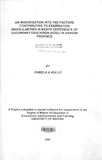| dc.description.abstract | Examination irregularities at the global, regional and local levels
have emerged as a major concern for the educationists and society
at large. Several strategies to tackle these problems have been
considered including the use of the law to discourage malpractices
in examinations. The underlying objective of this study was to
investigate factors contributing to examination irregularities in
Kenya Certificate of Secondary Education (K.C.S.E) m Nairobi
Province.
The study attempted to investigate the extent to which malpractices
in KCSE examination has been attributed to teachers, school
administrators, students, parents, supervisors and invigilators. It
looked at the attitude of both teachers and students towards
education and malpractices in examinations.
The sample of the study was composed of form three students in
questionnaires, interview schedule and observation guide. Using
simple descriptive statistics data were analysed and results
presented in tables of frequency distribution.
The study revealed that examinations were an important aspect of
education; that teachers and students in secondary schools have
positive attitudes towards education and examination; that all
teachers needed training III ethics and integrity and that
malpractices in examination should be dealt with decisively.
The findings were examined and then implications discussed.
General recommendations made on dealing with examination
irregularities were:
Teachers should be remunerated well for services offered during
invigilation and supervisron; the key people during examination
period should be properly trained; students should be adequately
prepared in advance for the examination with issues like syllabus
coverage checked into; enough revrsion and psychological
preparation for examination to ensure a cheating free examination
environment.
In conclusion, suggestions. for future research have also been
made. The role of the Kenya National Examinations Council in
reducing cheating could be looked at. The study could also be
repeated in a rural setting. Lastly, the way examinations are
administered in the field is another area that could be studied. | en |

